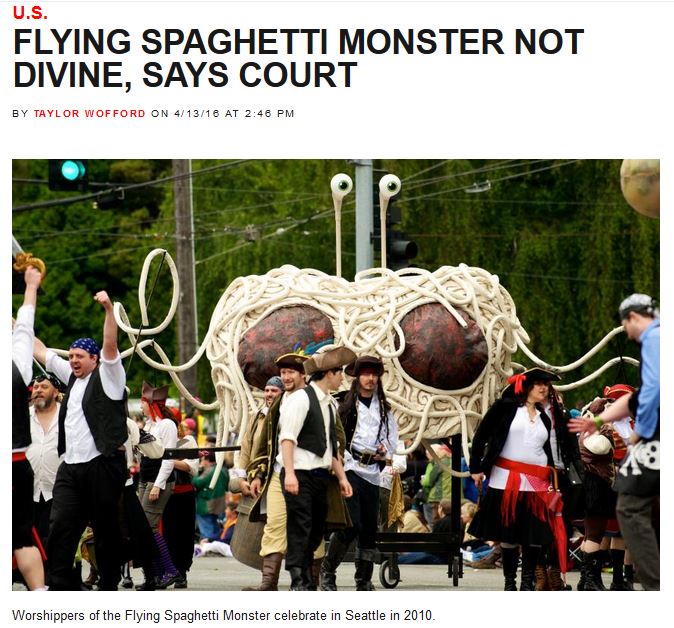 I’ve seen some comments on social media about this recent court decision — click the image to read about it. (If you don’t know much about Pastafarianism then go here.) As a scholar of religion interested not so much in studying religion but, rather, in studying those who use the term to accomplish practical social work (by classifying this or that as religion [or not!]), I admit that I can be a little disappointed when I see other scholars of religion chime in about such decisions. For by failing to see the term “religion” as a rhetorical device, as a tool some people use to manage social life by naming, distinguishing, and then ranking assorted items, scholars often unwittingly enter into debates over what religion really is (or isn’t).
I’ve seen some comments on social media about this recent court decision — click the image to read about it. (If you don’t know much about Pastafarianism then go here.) As a scholar of religion interested not so much in studying religion but, rather, in studying those who use the term to accomplish practical social work (by classifying this or that as religion [or not!]), I admit that I can be a little disappointed when I see other scholars of religion chime in about such decisions. For by failing to see the term “religion” as a rhetorical device, as a tool some people use to manage social life by naming, distinguishing, and then ranking assorted items, scholars often unwittingly enter into debates over what religion really is (or isn’t).
And, in the process, they make themselves data for people like me.
So over on Facebook I made the following comment on a post about the decision:

So, for those who happen to share my interests, this decision is a wonderful e.g., for it is a moment when powerful social actors drew a line.
What will be the result? Stay tuned to find out….
Now, the way in which the line was drawn is equally interesting; for given that religion is commonly said to be something sincere and of deep significance to the believer, then something that looks fun or as if it is a parody can’t, by definition, be a religion. But in order for the public sphere to work — a place where possibly conflicting deep commitments something meet head-on — there are times when we all need to take these sincerely held beliefs rather lightly.
Taking them too lightly is parody while taking them just lightly enough is admirable tolerance.
It’s a little like Goldilocks testing out beds.
Perhaps you recall Kim Davis who was a clerk in Rowan County, Kentucky, and who wouldn’t issue same sex marriage certificates last year….

Here we have a recent example where the supposedly deep and sincere beliefs were, apparently, held a little too sincerely, for they weren’t let go when they conflicted with Federal law.
So my point is that, rather than contest what religion really is or how it ought to be understood, scholars of religion with an interest in social theory could instead make much of these recent examples to illustrate how the very designation of something as religious or as sincere functions in a diverse liberal democracy.
It’s all about how difference is managed.